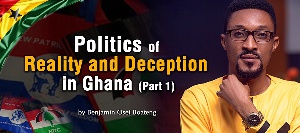Since the return to constitutional governance over two decades ago, competitive elections have been conspicuous landmarks of Ghana’s young democracy. Politics has become a legitimate national exercise and that has necessitated some writers having various researches in that regard. Some of these research findings have proven to be reflections of the society in which we live.
Anytime I see energetic young men and women wasting their lives in traffic selling dog chains and “pure water”, my heart bleeds for the future generation. It saddens my heart that we have youth who are ready to do anything to cause change and yet, the opportunities to do so elude them each day. A passionate writer like me will always have interest in issues that affect the so-called “ordinary Ghanaian” but no one deserves to be called “ordinary Ghanaian” because the constitution of the Republic of Ghana makes it clear that citizens are all equal in the eyes of the law.
Over the years, there have been attempts by public office holders especially politicians to further widen the gap between the elite and less privileged in society. These problems are economic deprivation, bribery and corruption, the rigging and manipulation of election results, and the “create, loot and share” phenomenon. Others include the thirst for power, wealth, fame and perpetuation of selfish tribal agenda. The root causes of these counterproductive attitudes are the impunity and inordinate desire for recognition and political power.
With the current situation, given the abundant natural resources at our disposal, many political analysts opine that Ghana could have done much better than where we are. It is quite evident that deception, lies and hypocrisy have become endemic not only on the political landscape but also in the great majority of institutions in Ghana. Some civil society organizations and even church leaders have also joined the campaign trail. Many are beginning to believe that deception is an inevitable part of politics and statesmanship. Even though it is understandable that there are times public officials are compelled to lie to defend the public interest, this phenomenon tends to discourage many genuine and well-meaning Ghanaians from putting themselves up for public office. Obviously, this has led to wanton dissipation of public funds and gargantuan levels of financial malfeasance. Currently, not a week passes without new revelations about corruption and corruption-related offenses. The political landscape has been left in the hands of celebrities and the rich in society who see politics as an avenue for making profit.
Polarization, cronyism and nepotism have gradually been ingrained into the fabric of the Ghanaian by successive governments for selfish gains. One’s ability to lie cleverly or convincingly has become the yardstick in determining the pace at which one climbs the political ladder. Party communications have been left in the hands of people who can lie and insult the most. The recent voter’s registration exercise by the Electoral Commission of Ghana gives credence to this observation. Political apparatchiks were seen visibly campaigning along ethnic ideologies and defending the indefensible. This has further polarized voters in the run up to the upcoming general elections.
Though crime knows no party colour, we are almost getting to a stage where political parties brand even heinous crimes with party paraphernalia with such impunity. The recent disturbances recorded at the Odododiodio and Ayawaso West Wuogon constituencies in the Greater Accra region where party fanatics were seen brandishing guns openly and destroying properties is still fresh on our minds. It is apparent, that putting trust in some politicians to fulfill all promises if elected, is as naive as expecting a prostitute to be a virgin.
Interestingly, even seemingly honest and incorruptible persons, after securing political power, metamorphosed into what I call “political animals” where they support their party’s agenda in and out of parliament regardless of its propriety. We have seen young energetic men and women enter parliament beaming with ideas to change this dogma and then all of a sudden, as if they have been injected with deadly viruses, join the others to sing the same choruses. We are gradually gravitating towards a society where truth has been consciously murdered and lies elevated to the high table. The by-product of this anomaly is what we are experiencing today, under-development.
As the general election draws closer, some politicians have employed certain techniques to woo majority of the population to vote for them. The Ghanaian’s ability to deeply understand these mind-controlling techniques which can be deceptive in order to make an informed choice is critical in choosing the right leaders.
Is politics all about deception? Watch out for part 2.
To be continued!
Click to view details



Opinions of Saturday, 5 December 2020
Columnist: Benjamin Osei Boateng
Politics of deceit and the reality in Ghana
Opinions


















